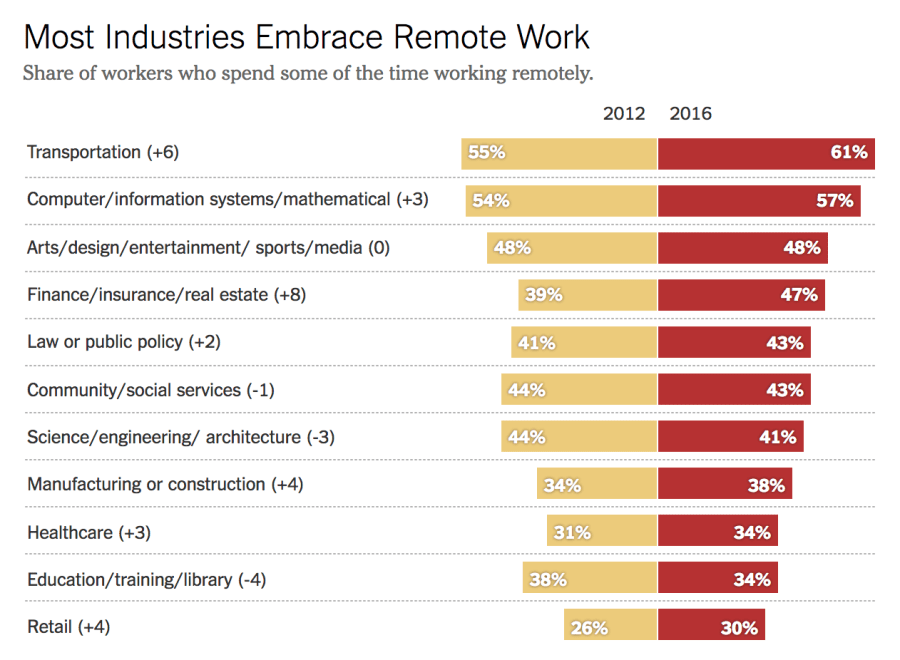
In Part 1 of the Going Nomad series, I explained why my partner Lauren and I are moving to Mexico at the end of the year. In Part 2, I’ll tell you what I see as our top five challenges in making the transition to remote work.
These challenges seem to be fairly common for anyone moving abroad. I don’t claim to have any universal answers, but by documenting our thought process I’m hoping to show one way they can be overcome.
1. Location-independent income
This is, of course, the obvious one. No matter how cheap a foreign country can be, you still need to live on something. Not to mention save and invest for the future.
This has fortunately become possible for me over the last couple years as Forte Labs has transitioned from offering primarily live trainings, to primarily online courses and other information products. The team is already mostly remote, so that won’t be a problem. I will still need to do some travel for conferences and consulting work, but I do that already anyway.
I wish I could say this was a long-term strategic plan, but it wasn’t. I made the transition because online products better fit my interests, needs, and skills, and only more recently did I realize they also made my location irrelevant.
On Lauren’s side, she is leaving her current job in San Francisco and taking some time off to decide what she wants to do next. The ⅔ drop in living expenses should give us some extra buffer to allow her to do that.
I think having a location-independent source of income is the biggest barrier to most people living abroad. There have been several waves of people entering the exo-workforce, defined mainly by their profession and the connectivity they require to stay productive:
- Pre-digital: artists, writers, journalists, photographers, and others who didn’t need connectivity for long periods
- 1st wave: solo entrepreneurs and internet marketers living in tropical locales, who only needed occasional connectivity
- 2nd wave: software developers and other information-intensive jobs, who need consistent connectivity but can work independently for substantial periods
- 3rd wave: other knowledge workers who primarily work on a computer, who need constant connectivity and collaborate frequently
We’re currently in the third wave, which is why it’s the least clear. Will this be the great explosion of remote work long predicted? Or just another small group joining the movement?
What seems to be most unique about the current wave is that there are entire remote-first organizations, and that they see it not just as a cost-cutting measure, but as a strategic advantage. Influential companies like Github, Automattic, and Zapier are aggressively and vocally remote, seeing it as a way to attract and retain talent with strong salaries in affordable locales.
Although the range of jobs that can be done remotely has expanded a lot in recent years, it remains a fairly limited slice of the workforce. This Gallup survey shows 43% of employees working remotely at least part of the time, but only 31% between 80-100% of the time. And it remains much harder for certain industries like retail, healthcare, manufacturing, and education.
2. What to do with our belongings
This has been a surprisingly hard one. I would love to just give it all away, but that’s not very responsible. What seems to be emerging is a rule of thirds:
- Sell about ⅓: the high-value but not personally important items that are worth the trouble of selling
- Give away about ⅓: the things that our friends or family happen to need or want, with the rest going to charity as a donation
- Save about ⅓: I’d prefer this was much less, but with the possibility that we’ll only be gone a year, a lot of things will still be just as useful and are worth keeping. Also, things with sentimental value.
The key unknown variable seems to be how long we’ll be gone. Our current commitment is at least a year, but if that was much longer it would have quite an impact on these decisions. It’s not much of a risk though since we have space in our parents’ houses, and don’t need to pay for monthly storage.
One last note: the hardest part about this one is selling things. There are good ways to sell individual items (Craigslist, OfferUp, Letgo), but selling such a variety of things seems to require a lot of time taking photos, writing descriptions, messaging back and forth, agreeing on a price, scheduling pickups, etc. We need digital garage sales for people without garages!
At the same time, getting rid of stuff is one of the things I’m most excited about. I’ve been very inspired by Marie Kondo and her “tidying up” method, and the message of The Minimalists. Over 6 years in the San Francisco Bay Area, we’ve accumulated an extraordinary amount of crap. I’m looking forward to downsizing.
3. Establishing a social life
Talking to many remote workers and digital nomads in recent months, both short term and long term, a common thread has emerged: as exhilarating as living abroad can be, it is lonely.
Taking a quick tour of Southeast Asia or South America is one thing. You may be traveling with friends, or meet people in the many hostels specifically designed for this purpose. But once you drop out of the tourist crowd and settle in somewhere, the lack of built-in community quickly becomes apparent.
On the other hand, I think I’ve experienced more loneliness living in the U.S. than abroad. So I don’t think it’s a matter of location, but of mindset and social habits.
I’ve always addressed this the same three-fold way, during each of my abroad experiences in Brazil, Colombia, and Ukraine:
- Stay in one place for a long stretch: by putting down roots, you really can grow a community from scratch. Your foreignness and lack of existing relationships can actually make this much easier. You automatically stand out, and people will notice you’re a clueless foreigner with no common sense, and take you in.
- Commit to the culture and language: it’s possible to be physically located abroad, but spend most of your energy on existing habits and relationships. There is an important mental shift that happens when you decide that you are going to become part of the culture. Listen to their music, watch their TV shows, change your computer to the local language, eat their food. Commit to learning the language as soon as you arrive, even if you don’t think you can master it. The experience will be totally different.
- Get involved with local groups and activities: these were built in for my previous abroad experiences. In Brazil I worked for a local non-profit school, which embedded me deeply in the community. In Colombia I went to work every day at a microfinance bank. And in Ukraine I was a Peace Corps volunteer, which came with a whole set of responsibilities and relationships.
We’re going to need to work a little harder in Mexico City for this last one. Spending most of our time together and working mostly on our computers, it would be very easy to just be “Americans while abroad.”
Here are the actions we’re taking to ensure we embed ourselves in a community:
- Staying initially in private room Airbnbs with local residents, so we can hang out and talk to them
- Choosing a place to live in a central, walkable neighborhood
- Asking our friends/contacts for introductions to interesting people in the city, who we’ll invite to meet up for coffee
- Joining the local group for a leadership program offered by Landmark, which will put us weekly in a classroom with other people interested in personal growth and entrepreneurship, and in Spanish
- Taking other classes and joining other groups related to our interests (like salsa groups, cooking classes, workout classes, etc.)
- Joining a coworking space within walking distance of where we live, so we’re not cooped up at home
I’m open to any other recommendations you may have for building community! And would love introductions to cool people in Mexico City doing interesting work.
4. Maintaining existing relationships
As important as it is to form new friendships, we also don’t want to lose existing ones! This is another common challenge I’ve heard from long-term expats.
This is partly why we chose Mexico City as our home base. It isn’t very far from California, and flights are cheap. With scheduling flexibility, we can get round-trip flights on Volaris for as cheap as $180, which means we’ll probably come home every couple months. It’s also a city many people want to visit, and we’re planning on having an extra bedroom to make visiting us as enticing as possible.
I’m currently researching various travel hacking techniques, including what’s known as “miles churning” – taking advantage of signup bonuses and other promotions to rack up free airline miles. It’s quite a rabbit hole that you could spend all your time diving into, but I think there is a minimal yet strategic approach that captures most of the benefits with little time required. I’ll write about that soon.
5. Mindset shift
I think for most people, the most fundamental challenge is the shift in mindset required. Especially if you didn’t grow up traveling or haven’t spent much time overseas, it can seem like a scary place. Much of the news we hear is of danger and disaster, which just doesn’t reflect the day to day reality.
The places I have lived were considered either outright warzones, or at least unstable. But my memories are filled with the warmest memories of close-knit communities that embraced me without a second thought. My recollection is of fascinating cultures, teaching me things I never knew I wanted to learn, pushing me far beyond my comfort zone but with love and caring.
The mindset we want to shift to is one of curiosity, adventure, and wonder. To be unattached to what happens and when. To say yes when we don’t even know what we’re saying yes to. I’ve found time and again that trusting people I hardly know, putting my faith in those who seem so different from me on the outside, renews my basic faith in humanity.
I don’t know of any other experience that makes me feel so alive, and I can’t wait to begin the next leg of the journey.
The Only Subscription
You Need to
Stay at the
Edge of AI
The essential toolkit for those shaping the future
"This might be the best value you
can get from an AI subscription."
- Jay S.
Join 100,000+ leaders, builders, and innovators

Email address
Already have an account? Sign in
What is included in a subscription?
Daily insights from AI pioneers + early access to powerful AI tools








Comments
Don't have an account? Sign up!